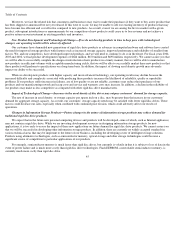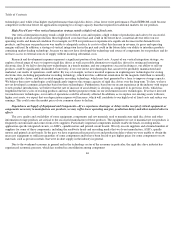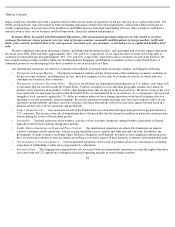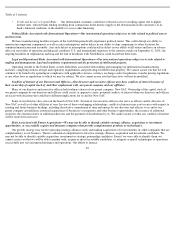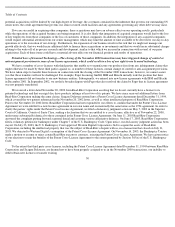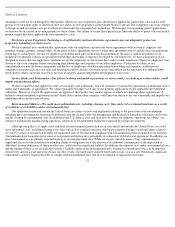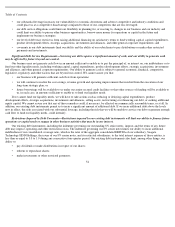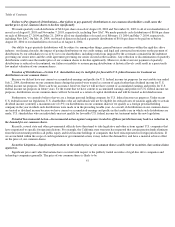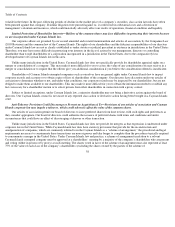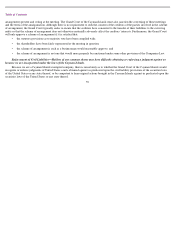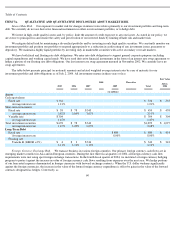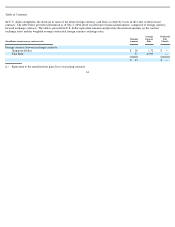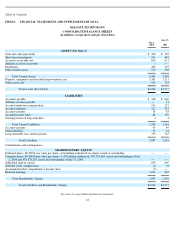Seagate 2003 Annual Report Download - page 56
Download and view the complete annual report
Please find page 56 of the 2003 Seagate annual report below. You can navigate through the pages in the report by either clicking on the pages listed below, or by using the keyword search tool below to find specific information within the annual report.
Table of Contents
•
sell assets;
•
issue or sell shares of restricted subsidiaries;
•
enter into transactions with affiliates;
•
create liens;
•
enter into sale/leaseback transactions;
•
effect a consolidation or merger; and
These covenants are subject to a number of important qualifications and exceptions, including exceptions that permit us to make
significant distributions of cash. In addition, the obligation to comply with many of the covenants under the indenture governing our 8% senior
notes will cease to apply if the notes achieve investment grade status.
Our existing debt instruments also require us to achieve specified financial and operating results and maintain compliance with specified
financial ratios. Our ability to comply with these ratios may be affected by events beyond our control.
A breach of any of the restrictive covenants described above or our inability to comply with the required financial ratios could result in a
default under our existing debt instruments. If a default occurs, the holders of our outstanding 8% senior notes may elect to declare all of our
outstanding obligations, together with accrued interest and other fees, to be immediately due and payable. If our outstanding indebtedness were
to be accelerated, we cannot assure you that our assets would be sufficient to repay in full that debt and any future indebtedness, which would
cause the market price of our common shares to decline significantly.
Risks Related to Our Common Shares
•
make certain amendments to our deferred compensation plans.
Control by Our Sponsor Group—Because our sponsor group, through its ownership of New SAC, will continue to hold a controlling
interest in us, the influence of our public shareholders over significant corporate actions will be limited.
As of July 2, 2004, New SAC owns approximately 61.5% of our outstanding common shares. New SAC was formed in connection with
the November 2000 transactions and is owned by our sponsor group and members of our management. Through their ownership of New SAC,
as of July 2, 2004, affiliates of Silver Lake Partners, Texas Pacific Group, August Capital, J.P. Morgan Partners, LLC and investment
partnerships affiliated with Goldman, Sachs & Co. indirectly own approximately 19.5%, 13.6%, 7.0%, 4.0% and 1.3%, respectively, of our
outstanding common shares. The sponsors’ and our managements’ ownership of New SAC and New SAC’s and the sponsors’ ownership of us
is the subject of shareholders agreements and other arrangements that result in the sponsors’ acting as a group with respect to all matters
submitted to our shareholders. As a result, as long as New SAC or the members of our sponsor group continue to own over 50% of our
outstanding common shares, they will continue to have the power to:
•
control all matters submitted to our shareholders;
•
elect all of our directors; and
Even if New SAC holds less than 50% of our outstanding common shares and loses certain contractual rights under our shareholders
agreement, it will continue to have a significant influence over these matters. Also, New SAC is not prohibited from selling a controlling
interest in us to a third party.
Accordingly, our ability to engage in significant transactions, such as a merger, acquisition or liquidation, is limited without the consent
of New SAC, which is controlled by the members of our sponsor group. Conflicts of
55
•
exercise control over our business, policies and affairs.


